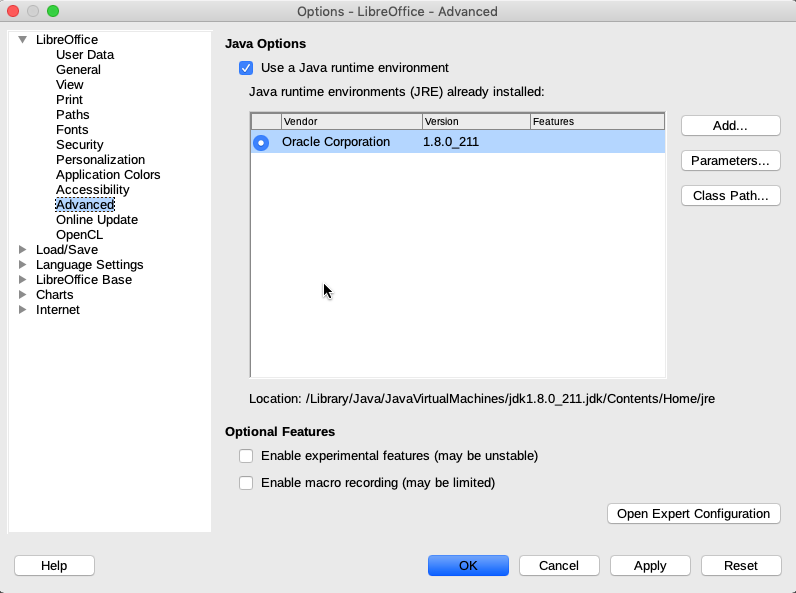
- INSTALL JAVA ON MAC AND SET CLASSPATH HOW TO
- INSTALL JAVA ON MAC AND SET CLASSPATH INSTALL
- INSTALL JAVA ON MAC AND SET CLASSPATH FULL
- INSTALL JAVA ON MAC AND SET CLASSPATH CODE
Now, you can customize a launch that can plug to a remote JVM. That should open a pop-up menu like the one below. Click on the Add configuration blue button you see on the screen. Go to the Debug view (Shift+⌘+D on Mac) and hit the gear ⚙ config️ button.

You can also set a breakpoint and hit Debug.įor remote debugging, you will need to add a new configuration.
INSTALL JAVA ON MAC AND SET CLASSPATH CODE
You can click Run, and the code will be compiled and executed. Once this extension is installed, you will notice two hyperlinks above the main method, like in the picture above. It has all the capabilities of a normal Java IDE debugging feature, and it allows greater customization and control over how things are executed and how the debugger is connected to the JVM. It will use the default JAVA_HOME on your computer, but this can be customized of course. Once you get the basics of writing and reading Java code on Visual Studio Code, the next step is for sure running and debugging. This extension adds many other capabilities that will help you navigate, write, refactor, and read Java source code quickly enough that you may as well ditch an IDE in favor of a lightweight text editor.īreadcrumbs navigation (top) - Outline view (bottom left)Ĭheck the overview page for a complete list of its features and refactoring shortcuts. The Language Support for Java extension brings Java support through the use of the Eclipse Language Server Protocol. This will generate a HelloWorld.class file. Once done, you can open the terminal - on Mac OS, type ⌘+` - and then type javac HelloWorld.java to compile the file. Start by creating a HelloWorld.java file and open on VS Code (or create the file within and then save in some folder).
INSTALL JAVA ON MAC AND SET CLASSPATH INSTALL
Once you install language support, you can read and edit Java source code. All other extensions are complementary but do consider them based on the types of projects you'll be working on. This is the one and the only extension you are required to install to have Java support. This extension pack bundles the five extensions below explained in detail, and it will help you get started without digging too much. There is a set of extensions that are the minimum requirement to get core Java support in VS Code. But check this guide below for a laser-focused walkthrough in getting the most out of VS Code for Java development. You can also skip this guide completely and simply go to the documentation page for Java in Visual Studio Code. The rest of this guide will assume you have at least Java 8 installed, though it works with Java 11, too. If you haven't already downloaded Visual Studio Code, install it now. Here's the ultimate guide of 2019 for Java developers to use Visual Studio Code to develop, run, debug, and deploy their applications. Unsurprisingly, VS Code can do Java as well, and many Java champions and speakers have chosen it for their on-stage appearances and live demos.

Javascript, TypeScript, Go, Python, and other languages have a massive amount of developers coding through VS Code, in part thanks to the huge ecosystem of extensions that enhance and enrich the experience in VS Code, turning it into a super smart text editor with IDE-ish capabilities while remaining ludicrously fast and lightweight. Java HotSpot(TM) Client VM (build 1.5.Visual Studio Code has come a long way to become the preferred text editor of polyglot developers. Java(TM) 2 Runtime Environment, Standard Edition (build 1.5.0_16-b06-284)
INSTALL JAVA ON MAC AND SET CLASSPATH HOW TO
Below are instructions on how to accomplish this instead:

If you want it to persist, you will have to add the command to your ~/.profile file. Note that this sets JAVA_HOME only for this session.

INSTALL JAVA ON MAC AND SET CLASSPATH FULL


 0 kommentar(er)
0 kommentar(er)
